Cats can do a lot of damage to your vegetable garden and your flowerbeds. And they can make your yard challenging to walk in barefoot. Whether you love or hate cats, chances are, you’ve had some need to keep them out of one of these things.
How to keep cats out of your yard, garden, and flowerbeds? To keep cats out of your yard, garden, and flowerbeds, you have spray options and physical barriers. You can also use sound, water, and home remedies which, if applied correctly, cats hate and will avoid. These methods are safe and non-toxic, so the cats will stay away, but they won’t be hurt.

While not everyone loves cats, most gardeners love their gardens and flowerbeds, and no one likes stepping in cat poop in the yard. We’ll take a closer look at some ways to discourage cats from going where we don’t want them to go.
Why Are Cats Attracted to Your Yard, Garden, and Flowerbeds?
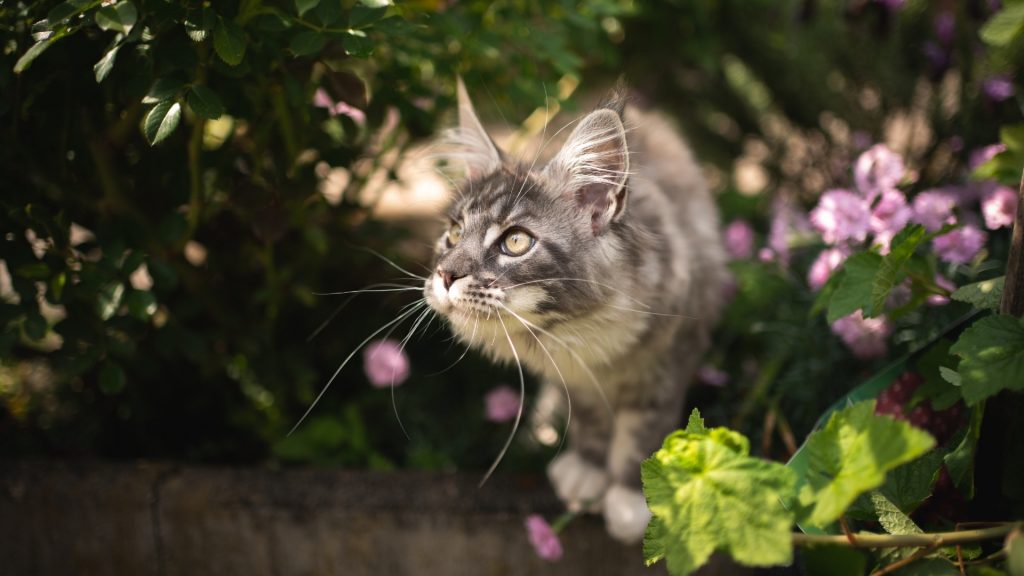
Gardens and flowerbeds have soft soil, so one reason cats enjoy digging in them is that it’s easier than digging in, say, a tightly packed dirt trail. But more than just “because they can,” cats dig for several reasons.
- They are hiding from predators. Cats are high up on the food chain, but they’re not apex predators. When they urinate or defecate, they are driven by instinct to bury the waste, which is what that digging is about. This makes it more difficult for a predator to smell that the cat is nearby.
- They are hiding from prey. Cats aren’t the only ones hiding from predators. Another reason they want to mask their scent is so that their prey do not realize there is a cat nearby.
- They are marking territory. Most of us have had a cat rub up against us, and though we like to believe it’s because they like us, cats are really marking us as part of their territory with their scent. Digging holes in the yard helps serve this same scent-marking purpose.
- They are sharpening claws. Cat claws grow in layers. To keep them sharp, cats need to remove the old outer layers from time to time, and digging helps this. Perhaps not as much as a scratching post or your sofa, but it does help them keep their claws sharp and trimmed.
Reasons Why You Should Protect Your Yard, and Especially a Vegetable Garden from Cat and Other Pets
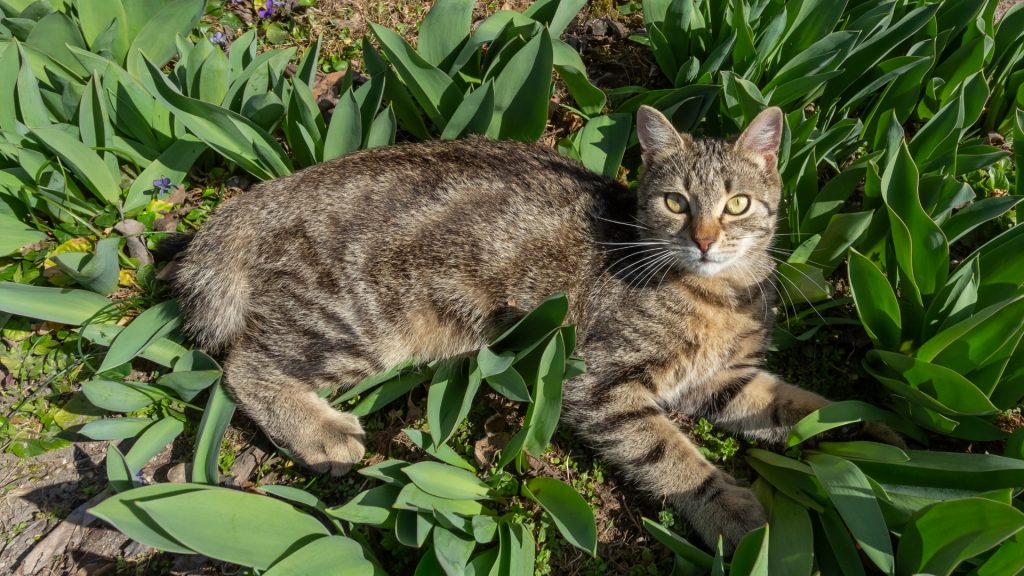
Consider also your vegetable garden. Fertilizing your veggies with cat poop is fertilizing your vegetables with all the potentially dangerous organisms that live in them, and that’s just unhealthy. Keeping cats away from your yard, garden, or flowerbeds is important to your health.
It’s also essential to your plants’ physical well-being. Cats often will use plants as a soft surface to lie on, so many plants get crushed under the weight of a sleeping cat. And if you put out bird or squirrel feeders without deterring cats from coming around, you are essentially setting up an all-you-can-eat buffet for felines.
Is Cat’s Urine and Poop Dangerous for Your Garden and Your Health?
Cat’s urine and poop are potential dangers to your health. While cats are notoriously fastidious creatures, their feces are not nearly as clean as the rest of them. Cat feces is off-limits to pregnant women because it tends to contain Toxoplasma gondii, a parasite.
And that’s healthy, cared-for cats. Strays are likely to be vectors of many more bacteria and possible infections.
Reaching down into the dirt of your garden and getting a handful of cat poop is gross, but that poop and cat urine are also slightly dangerous due to their unsanitary nature.
Should You Allow Your Cat to Enter Your Yard, Garden, or Flowerbeds?
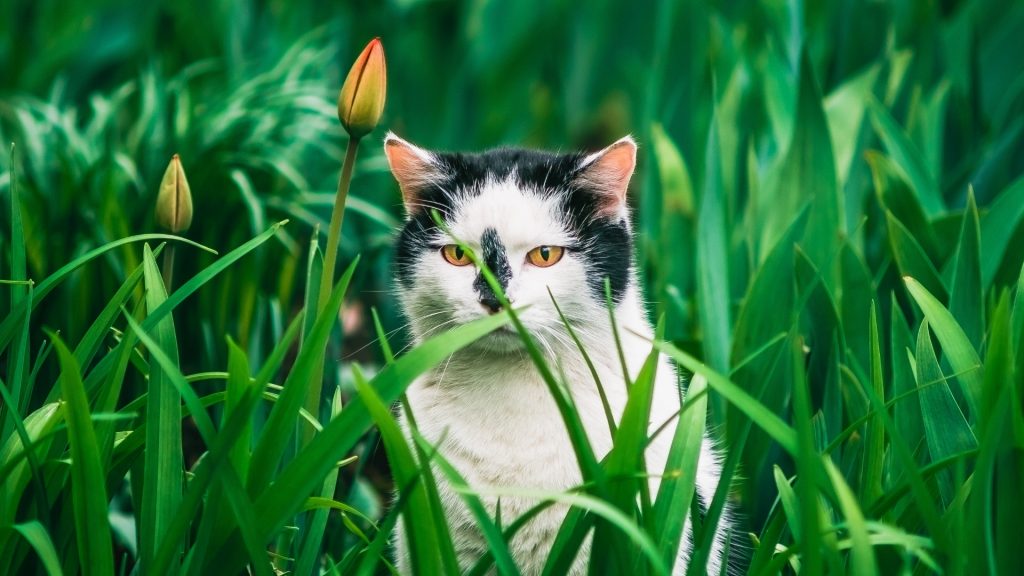
Because of the potential health issues above, you should not allow your cat to feel like at home in your garden or flowerbeds. Your yard, though, is another story. If yours is an outdoor cat, the yard is where you want it to be rather than in the street or in the neighbors’ yards.
If you have a cat that lives or at least spends some time outside, you will want to keep it out of your flowerbeds and gardens. But the chances are good that your cat will do that job for you when it comes to stray and neighborhood cats.
Will Your Cat Prevent Neighbor and Other Stray Cats From Entering Your Yard and Garden?
Because your cat marks its territory, other cats will usually avoid the area. There will be the occasional challenge to your cat’s supremacy resulting in fights and loud yowling, but for the most part, if you have a cat, it’s generally the main one you need to keep out of your garden and flowerbeds.
How to Train Your Cat to Be Careful Around Your Garden?
Really, the only way to get your cat to be careful around your garden is to get your cat to stay away from your garden. Cats are smart, but there’s no real way to teach them that, when they’re in your garden, they should be careful around your plants.
While you’re trying to stop your cat or neighborhood strays from mucking around in your garden, you must not abuse or harm the animals.
All products discussed here are safe for use with cats and other animals. Be sure any products or methods you employ in your flowerbed don’t do any harm to any creatures.
Disclaimer: Our Methods and Products are safe and non-lethal for cats and other pets.
How to Keep Cats Out of Your Yard, Garden and Flowerbeds | Safe Guide
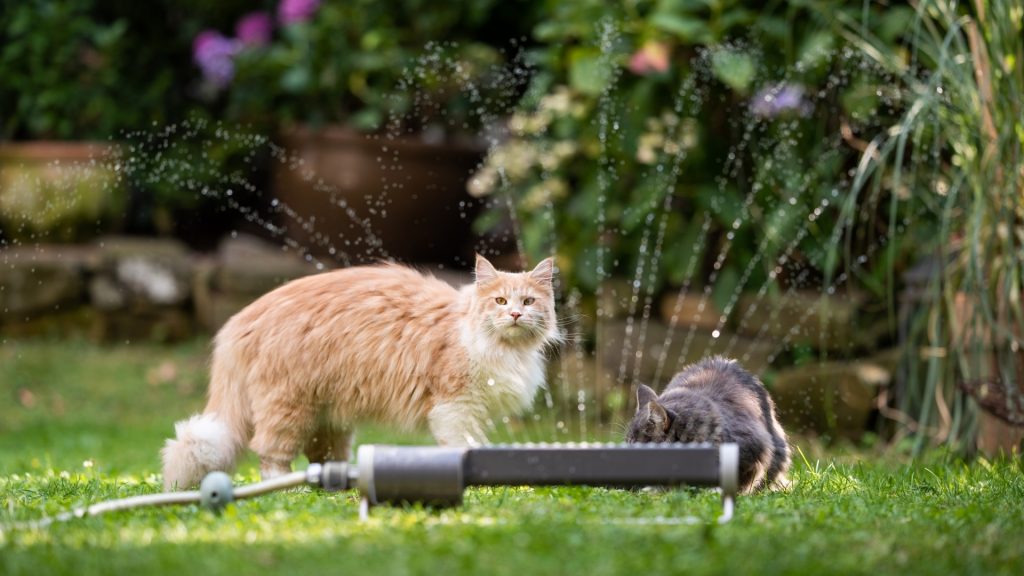
We specifically say “safe” because there are all sorts of bad things people might try. Loud sounds scare them, but nobody is telling anyone to fire a gun in the air to drive cats off.
So here are some safe things to try.
10 Ways to Keep Cats Out of Your Yard, Garden and Flowerbeds
1. Use natural repellents. Lots of chemicals may be a problem for many people, so there are homemade remedies discussed at length below. Some of the options are using essential oils like eucalyptus, lavender, and others or spreading coffee grounds around.
2. Commercial sprays are also an option. They can be much more effective than homemade remedies, but the trade-off is that you will be spreading chemicals around your property, and not everyone is keen to do that.
3. Don’t leave food out. This includes cat and dog food, but it also applies to bird feeders. No, the cats won’t eat the feed. But a bird feeder feeds birds, and the birds feed the cats. Also, don’t keep food trash in your garbage cans.
4. Eliminate hiding places. If you’ve got a crawl space, like space under your deck, a cat wants in there. So, it’s recommended to secure places like those on your property. Cats who can’t find a place to hole up on your property will move along to some better spot.
5. Wash away their scents. Cats rub against you not because they just love you but because they’re marking you as their property with their scent. They do the same thing to places in your yard, so spraying those spots down will get rid of that marking scent, and the cats will be less likely to think of that spot as theirs.
6. Plant things cats hate. There’s more on this below, but if you’ve already got a garden, spike it with some plants that cats don’t like to smell, including rue, geraniums, absinthe, lavender, and there’s even a plant called scaredy cat plant.
7. Get them wet. It’s a comic strip trope, the wet, miserable cat because it’s based on truth. If there’s a specific time the strays like to come around, you can spray them with a hose or even a water gun. When strays start equating your property with getting wet, they’ll stay away because even if you think cats are evil, no one thinks they’re stupid.
8. Use sound. Like with the sprinklers, there are motion-activated sirens out there that will make cats sprint away. Alternatively, even windchimes or tripline-activated jingle bells can be enough to startle cats away.
9. Use lights. Many homes already have motion sensor lights. If you don’t want to set your lights’ sensitivity high enough to detect cats, there are animal-specific, smaller lights you can place around your property to scare them away with photons.
10. Make your yard, garden, and flowerbeds uncomfortable for them. There is a spike strip available for exactly this purpose mentioned below, but anything you can do to make your yard, garden, and flowerbeds hostile places to them will be helpful – thorny plants, rocks and gravel, and the like.
How to Stop Cats from Pooping in Your Yard, Garden and Flowerbeds?
The way to keep cats from leaving treasures on your property is to encourage them to go somewhere else.
In addition to all the repellents and cat-discouraging methods herein, there are simple solutions like keeping twigs and other rough detritus in your garden. Cats don’t like walking on things like that.
Eggshells and gravel will accomplish the same thing. Also, we’ve mentioned using different smells, like the smell of bananas. Chop some up and place them around your garden, or even just use discarded peels. It’s all biodegradable, so your garden will benefit from it.
Any of the repellent methods discussed here will help with the problem, but as with just about anything, you’ll have to see what works best for you and your particular situation.
What to Do With Cat Poop in Garden?
Throw it away. Animal excrement is generally considered a good fertilizer, but cat poop has lots of nitrogen, parasites, and other bacteria in it that make the cat poop a health hazard.
Don’t put it in your compost heap, either. Pick it up out of the garden and throw it away. Then wash your hands.
If you are a pregnant woman, don’t do any of that, but rather find a non-pregnant person to do it for you. A poop-free garden is not worth the risk to your unborn child, because of some of the contaminants that cat feces can contain.
How to Stop Cats Digging in Your Yard, Garden and Flowerbeds?
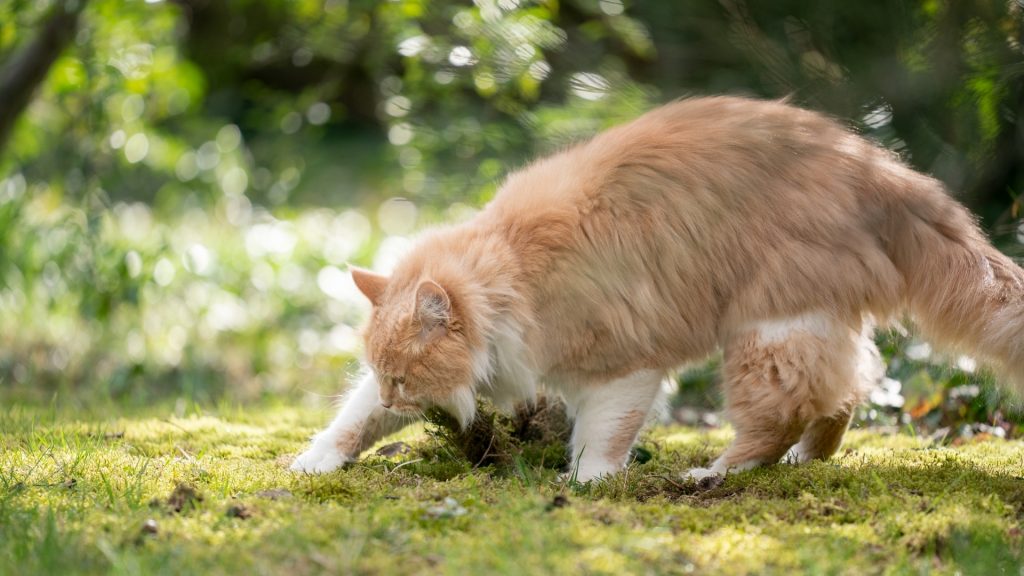
Homarden makes a set of Garden Cat Scare Mats you can put around your property. The mats have plastic spikes that stick up. They won’t hurt your cat if it steps on them, but the cat also won’t have any desire to lay down on top of them.
- Pet-Friendly Spike Solution: Securely deter cats and dogs from...
- Indoor and Outdoor Protection: Easily wrap our strips around...
- Versatile Repellent: Our cat and dog deterrent strips work...
- Gentle Training Alternative: Say goodbye to mace and shock...
- Easy to Implement: With their suitable dimensions, the anti-dig...
As a bonus, your cat won’t try to dig if it has to dig around spikes.
How to Neutralize Cat Urine in Flowerbeds?
Perhaps the worst thing about cats is the smell of their urine. Cat poop stinks, sure, but cat pee is one of those distinct smells that linger and are instantly recognizable. In addition to the smell, the acids and salts in cat urine are bad for your plants. When your cat pees in your flowerbeds or garden, it’s hurting your plants.
Since you probably water your flowerbeds and garden every day, you’re already helping to wash the urine away. Left to dry, cat pee crystallizes in the soil, and once it does, it’s harder to get out.
In addition to watering the area, a solution of baking soda and water (one tablespoon to 24 ounces) sprayed on the urine-soaked area will help neutralize the odor temporarily.
Once the uric acid in cat pee crystallizes, it will just smell bad again when it gets wet, so you have to break that acid down with an enzyme-based cleaner. Simple Green Outdoor Odor Eliminator does this, but whatever brand you choose, be sure it contains enzymes and bacteria according to its label.
- Quickly removes odors left behind by urine, stool, vomit and...
- For use on grass, artificial turf, gravel, concrete, brick and...
- Uses powerful, natural enzymes to eliminate odors at the source...
- Specially formulated for use around pets, on lawns and...
- Ideal for patios, decks, dog runs and yards
What to Use to Keep Cats Out of Your Garden and Flowerbeds? | Product Reviews
There are sprays, scents, oils, plants, sensors, alarms, and fencing to keep cats out of your property, some of which have already been mentioned, and some discussed further below. Let’s see!
Cat Repellents for Yard, Garden and Flowerbeds
Garden Secrets’ Compact Solar Ultrasonic Animal Repellent produces sounds pitched high enough that humans can’t hear them, but they drive animals away by driving them nuts.
- ✓ THE PERFECT SOLUTION FOR MAINTAINING THE GARDEN: Get rid of...
- ✓ 100% QUIET: Our powerful ultrasonic device is absolutely...
- ✓ SAVES TIME & MONEY: The powerful solar panel will save you...
- ✓ NO MORE CHEMICALS: You will no longer need to use hazardous...
- ✓ UPGRADE WITH CONFIDENCE: With us, you can rest assured that...
The Garden Secrets model is one of many available on Amazon. When it comes to how to keep cats out of your property, ultrasound is a solid weapon.
And then there’s the water mentioned earlier. Havahart Motion-Activated Animal Repellent & Sprinkler uses a motion sensor to direct a short blast of water at a cat or other intruder when they get too close.
- Naturally Repels – Repels nuisance animals such as birds, cats,...
- Detects & Deters – The device releases a startling surge of...
- Motion-Activated – An infrared sensor detects animal heat and...
- Multiple Settings – 4 sensitivity settings allow you to adjust...
- Eco-Friendly Design – The motion-activated repellent uses only...
Another choice is the Motion-Activated Water Jet Animal Repeller from Abco Tech.
- Most Humane Animal Deterrent: Scare away animals like cats, deer,...
- Advanced Motion Detection: The motion activated sprinklers for...
- Water-Efficient System: With a motion activated hose valve, the...
- Customizable Sensitivity: Adjust the motion sensor spray for cats...
- Quick And Easy Installation: The yard enforcer motion sprinkler...
Cat Deterrent Spray for Yard, Garden and Flowerbeds
Keeping cats out with commercial spray products is an option. The three listed here are safe and non-toxic to cats, other pets, and people, so you don’t have to worry about your dog or your kids getting too close to where you just sprayed.
Nature’s Mace Cat Repellent uses natural scents and should not wash away with one rainstorm. When used as directed, this product will keep cats out of flowerbeds and other spots.
- CAT TRAINING TOOL - Cat MACE is used as both a cat repellent and...
- HOW TO USE - Be sure to clean an area of any feces, and/or urine...
- SAFE-EFFECTIVE - Safe for use around children, pets, and plants!...
- ESSENTIAL OILS - Cat MACE is made up of essential oils that cats...
- ALL-SEASON PROTECTION - Apply Cat MACE year-round! Cat MACE can...
Bonide makes a product not specifically for cats but for all sorts of critters, so if you’re dealing with rabbits and dogs in addition to unwanted cat visitors, Go Away! Rabbit, Dog & Cat Repellent may be something to check into, as it will do the job without making a terrible stink that acts as a human deterrent, too.
- Go Away! Rabbit, Dog & Cat Repellent Granules by Bonide...
- Use this product as a training aid! While this product is an...
- Natural active ingredients are people and pet safe when used as...
- Protect yard, lawn, garden, flowerbeds, trees and shrubs. Natural...
- Go Away! Animal Repellent Granules arrive conveniently ready to...
For the environmentally conscious, and for people who want to keep their cats off the sofa in addition to out of the garden, there’s Colton’s Cat Repellent.
- Cat repellent spray for outdoor and indoor use; makes your yard,...
- Natural peppermint and citronella oil repellent ingredients; kid...
- Natural deterrent changes cats behavior around your property; as...
- This feline repellent lasts 2 to 4 weeks; always spray on heavy...
- We are confident if you spray regularly you will not have cat...
Designed for indoor and outdoor use and made from organic materials, Colton promises safe results no matter where in your home or outside your home you use it.
Safe and Natural Cat Repellents for Yard | Home Remedies
If you may want to avoid buying cat repellent sprays, you can make your own version of these products at home. It’s easy to make homemade cat repellents using essential oils, vinegar, and even garlic.
Just mix vinegar with the same amount of water and add few drops of essential oils, such as peppermint, clove, citronella, lemon, cinnamon, garlic, and lavender oil.
If you are a maladroit in the kitchen, even just leaving any kind of citrus peels in the garden will help deter cats from coming around, as they do not like those scents.
They also hate the smell of dried blood found in blood meal fertilizer, so that’s an option, and as a bonus, you’ll be helping your plants grow.
Is There a Cat Proof Garden and Flowerbed Fence?
Cat-proof fencing is available, and you may need it if you decide none of the above options are for you. Tenax makes a pet-specific roll of fencing that stands four feet tall, is made of polypropylene, and should be pretty durable.
- Material Type: Polypropylene
- Environmentally Friendly And Non-Toxic To Animals
- Virtually invisible
- Made in USA
- 1.77” x 1.97” mesh openings. Environmentally Friendly And...
It may not be as aesthetically pleasing, but Amagabeli 2 inch Hexagonal Mesh Fence will do the same job for a lower price.
- MATERIAL & SIZE: Galvanized chicken wire fencing 36inches x...
- STURDY MESH: 2 inch big holes chicken wire mesh, without the...
- HOUSE PROTECTION: Hexagonal poultry netting used to circle a 36in...
- GARDENING NETTING: Create predator protection guard, block grown...
- CUSTOMER CARE: We are dedicated to provide premium products for...
Related: How to Keep Animals Out of Your Garden Without Fence?
Summary
Keeping cats out of your yard, garden, and flowerbeds doesn’t have to be a never-ending battle. There are many options to repel cats from your gardens and property.
Some of them include planting flowers and plants cats don’t like, spraying cat repellents, using homemade remedies that produce cat-unfriendly odors, creating ultrasonic sounds, spraying water at them, laying down (humanely) spiked strips, or installing fencing.
List of Sources
Nuisance Cats – How to deter them from your garden. (2021). Kingborough Council.
Perry, L. Keeping Cats Out of the Garden. University of Vermont Extension.
Pokorny, K. (2018). How to keep frustrating felines out of the garden. The Oregon State University.
Cats in the Garden! What to Do? University of California Agriculture and Natural Resources.
- How to Get Rid of Copperheads | Practical Guide - August 27, 2023
- How to Get Rid of Corn Snakes | What Makes Them Aggressive? - August 27, 2023
- How to Get Rid of Alligators | Safety Measures and Removal Methods - July 16, 2023










